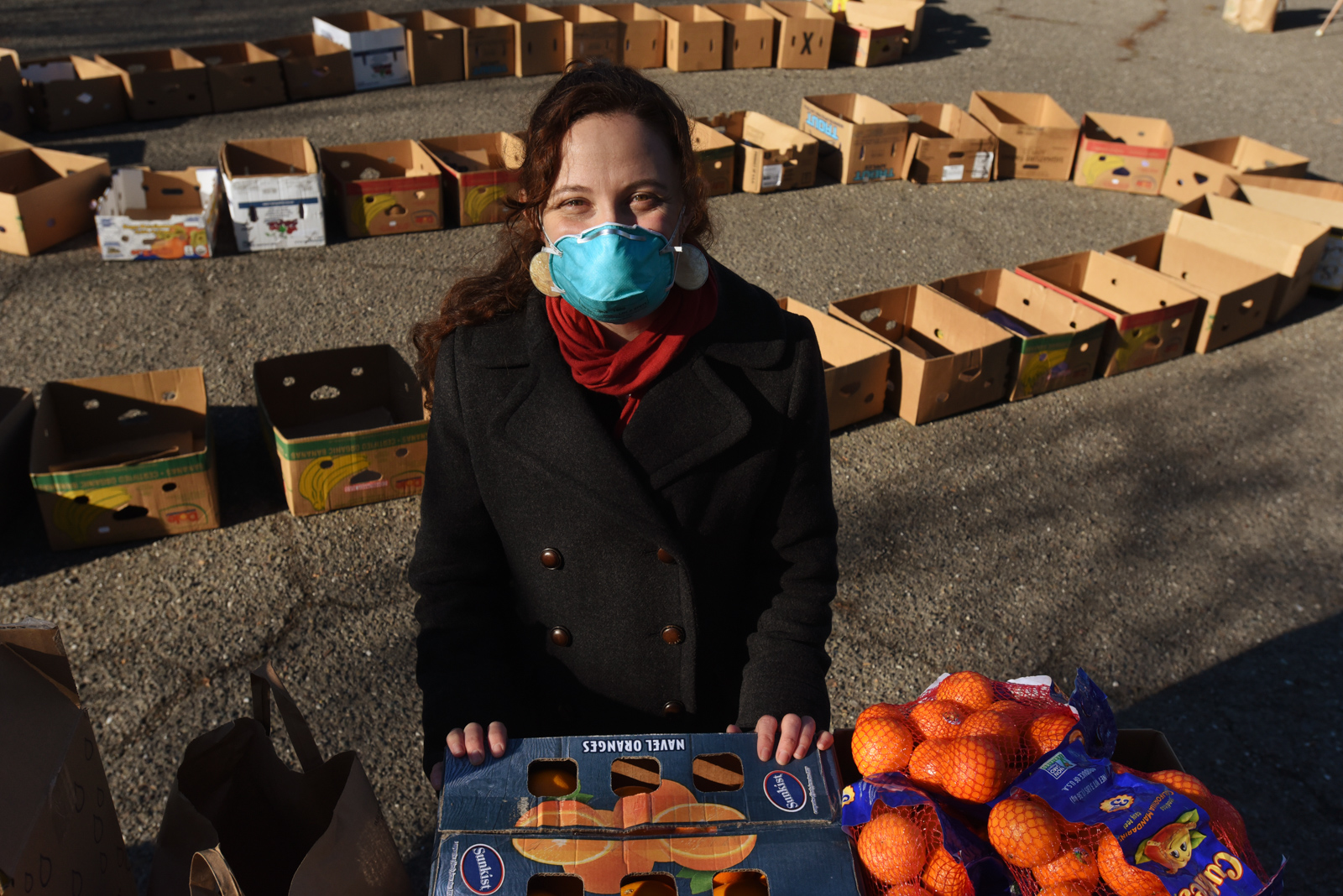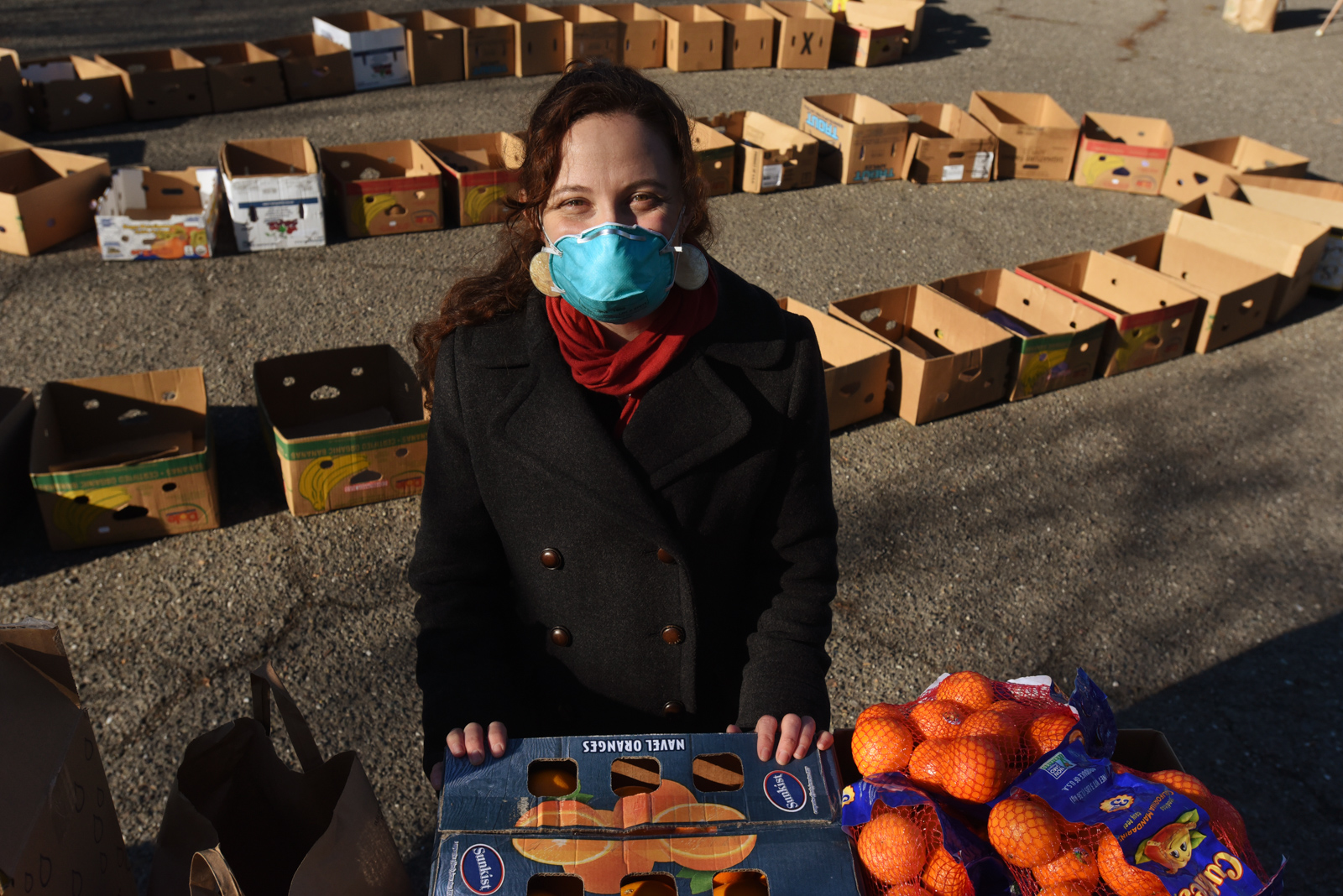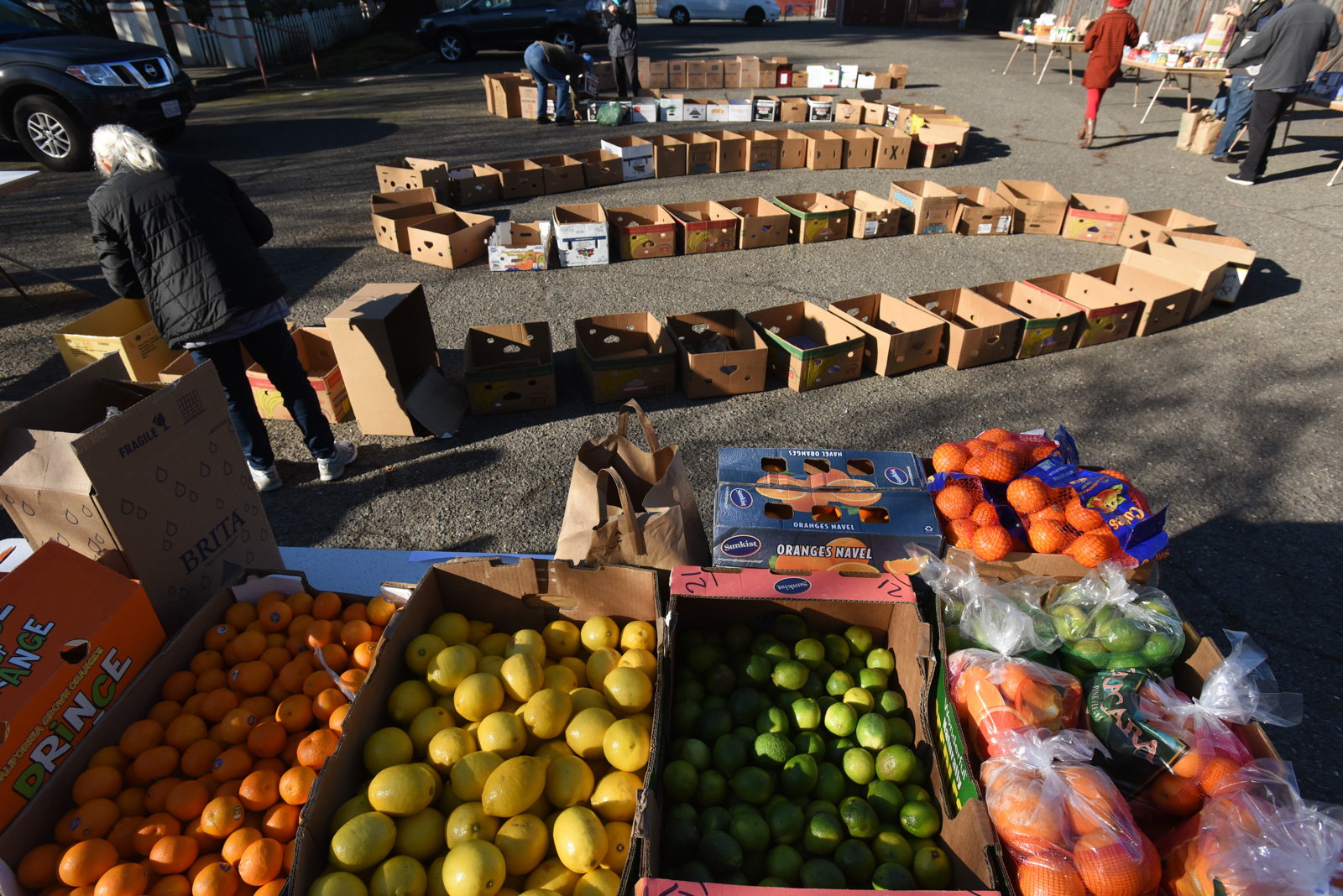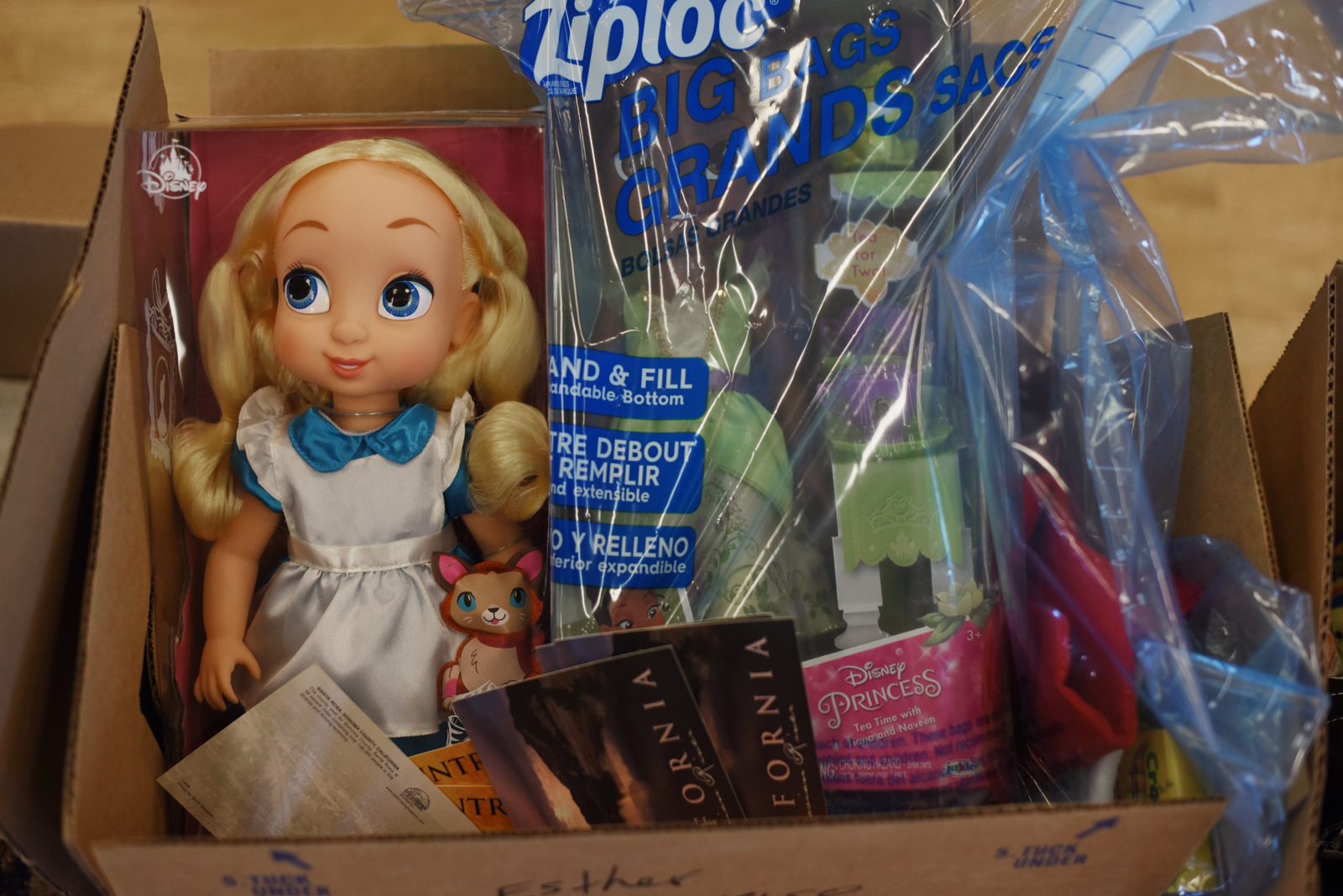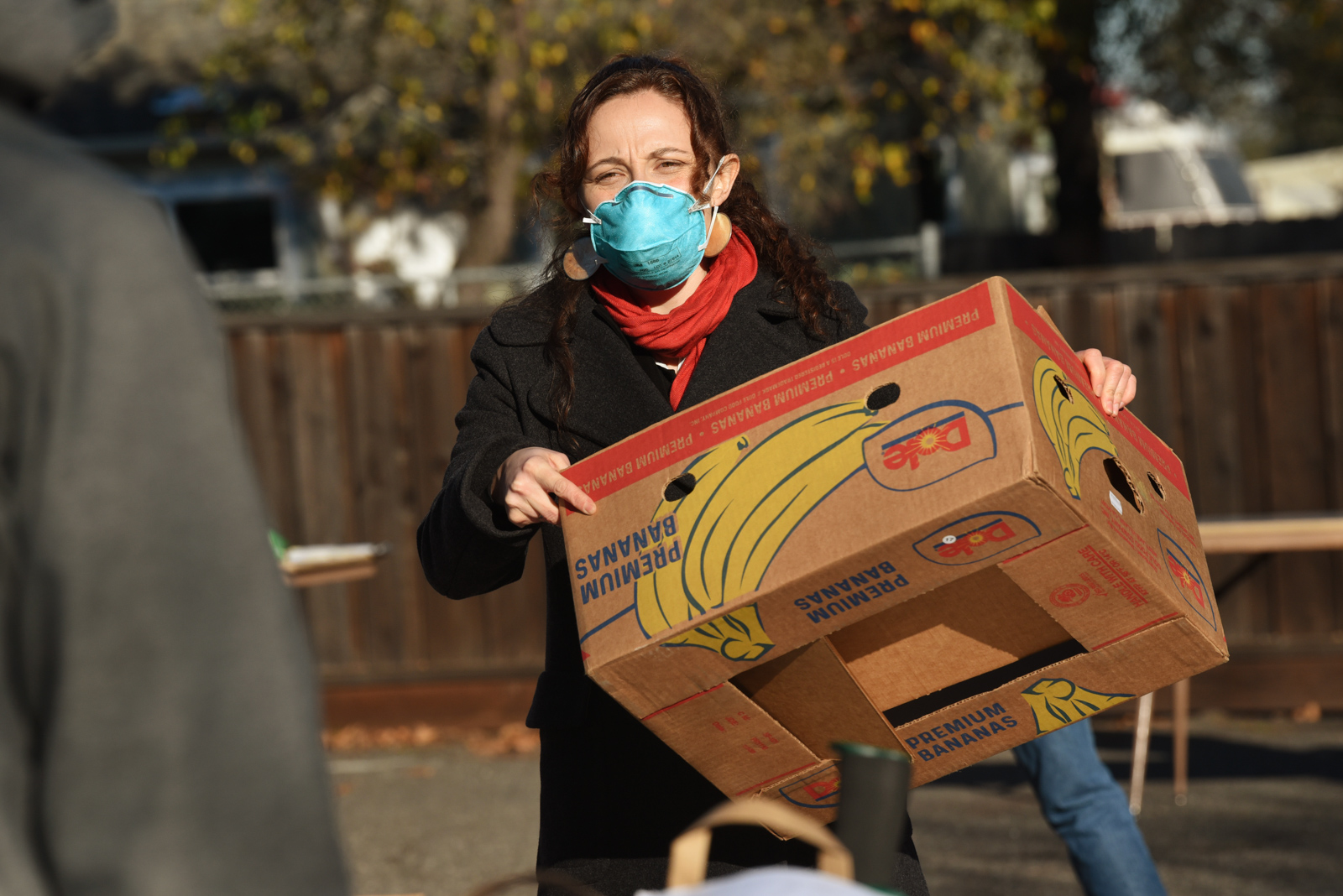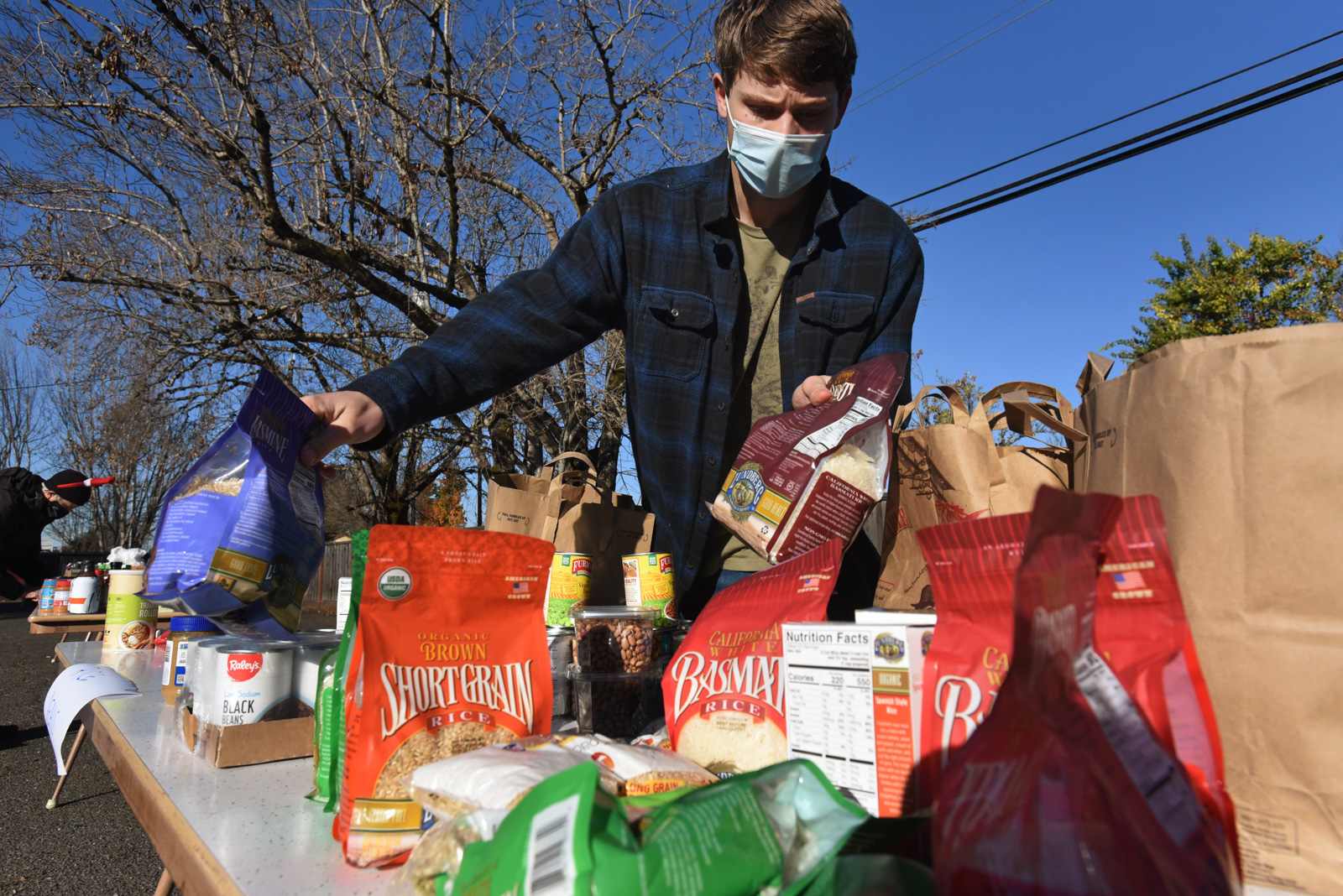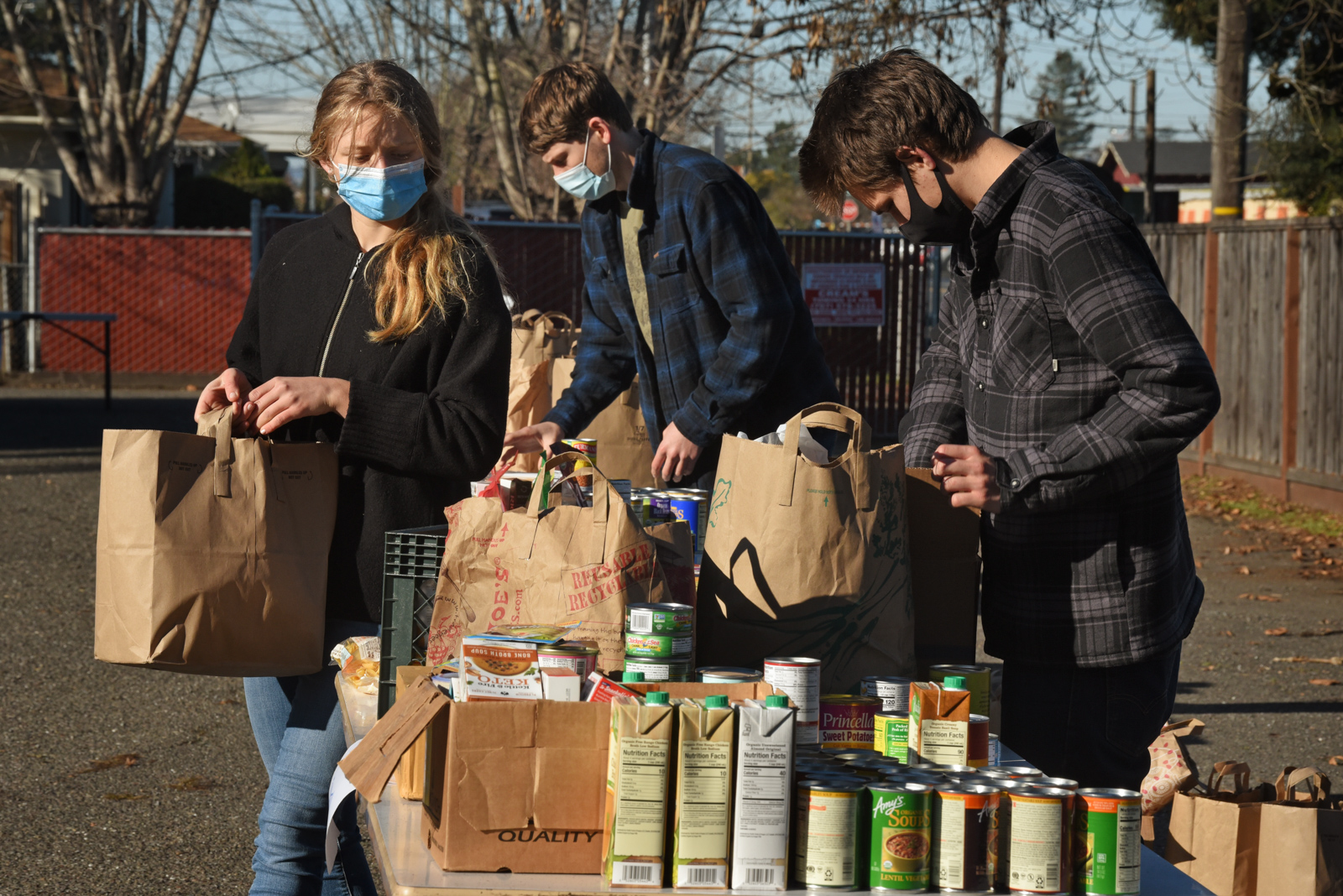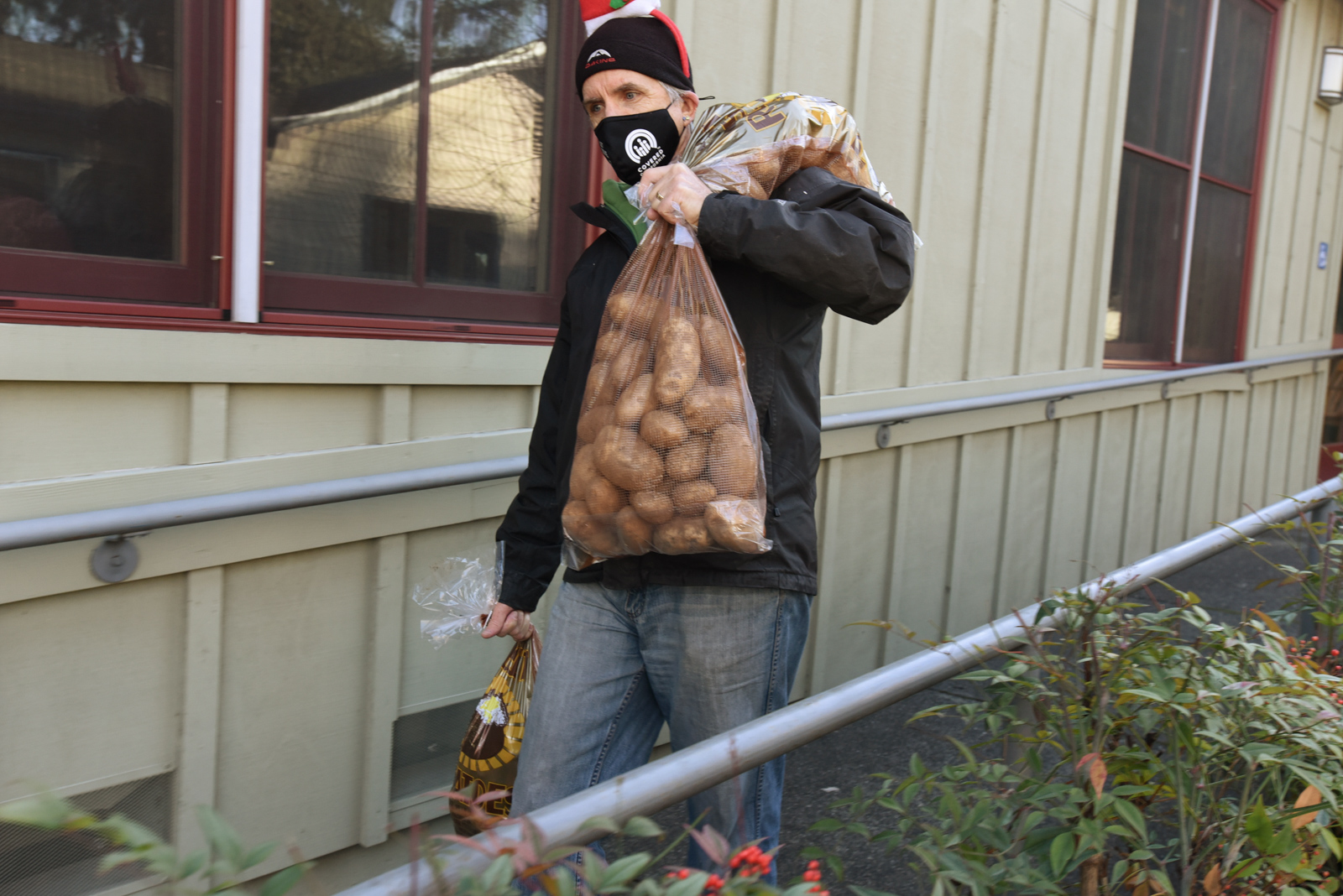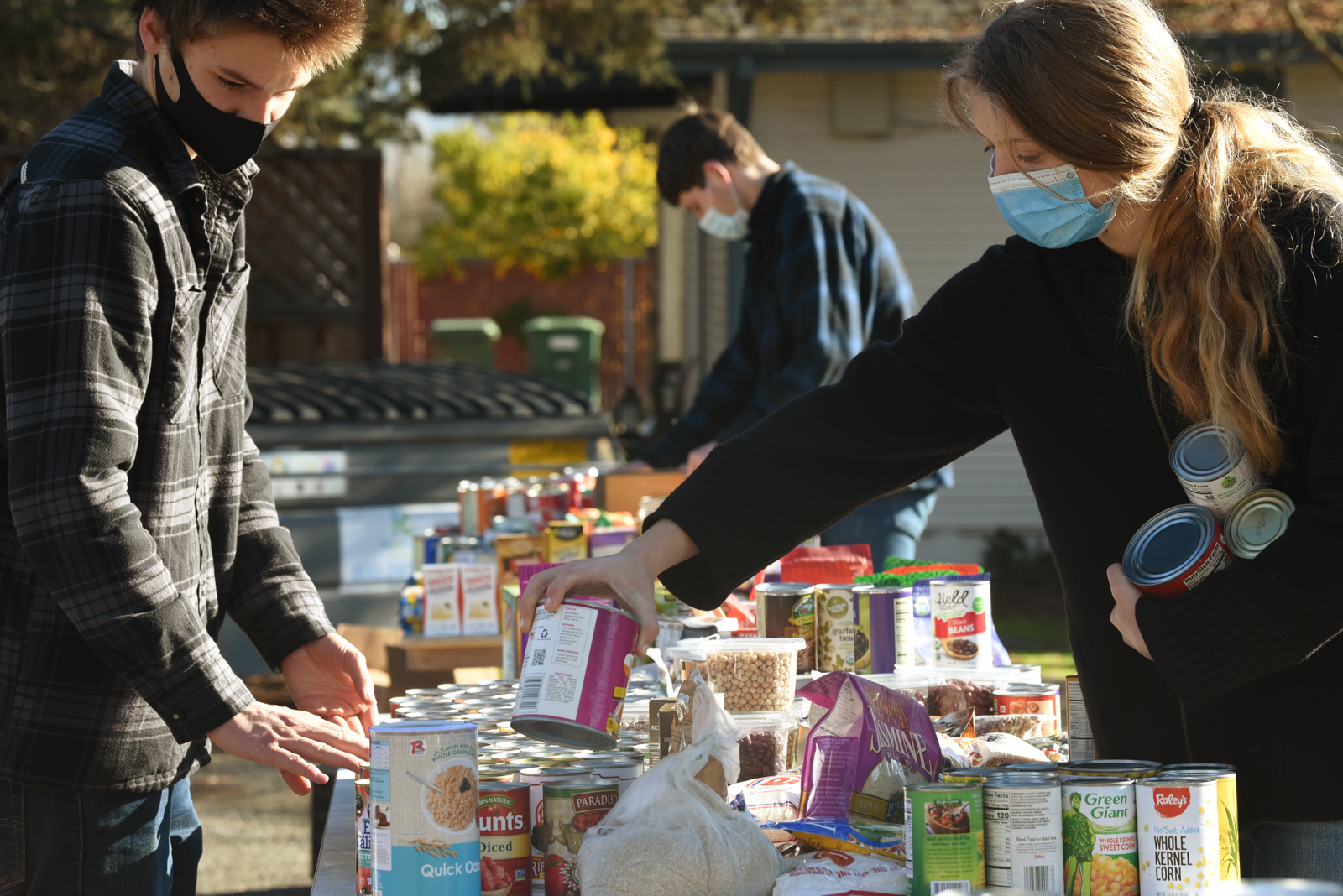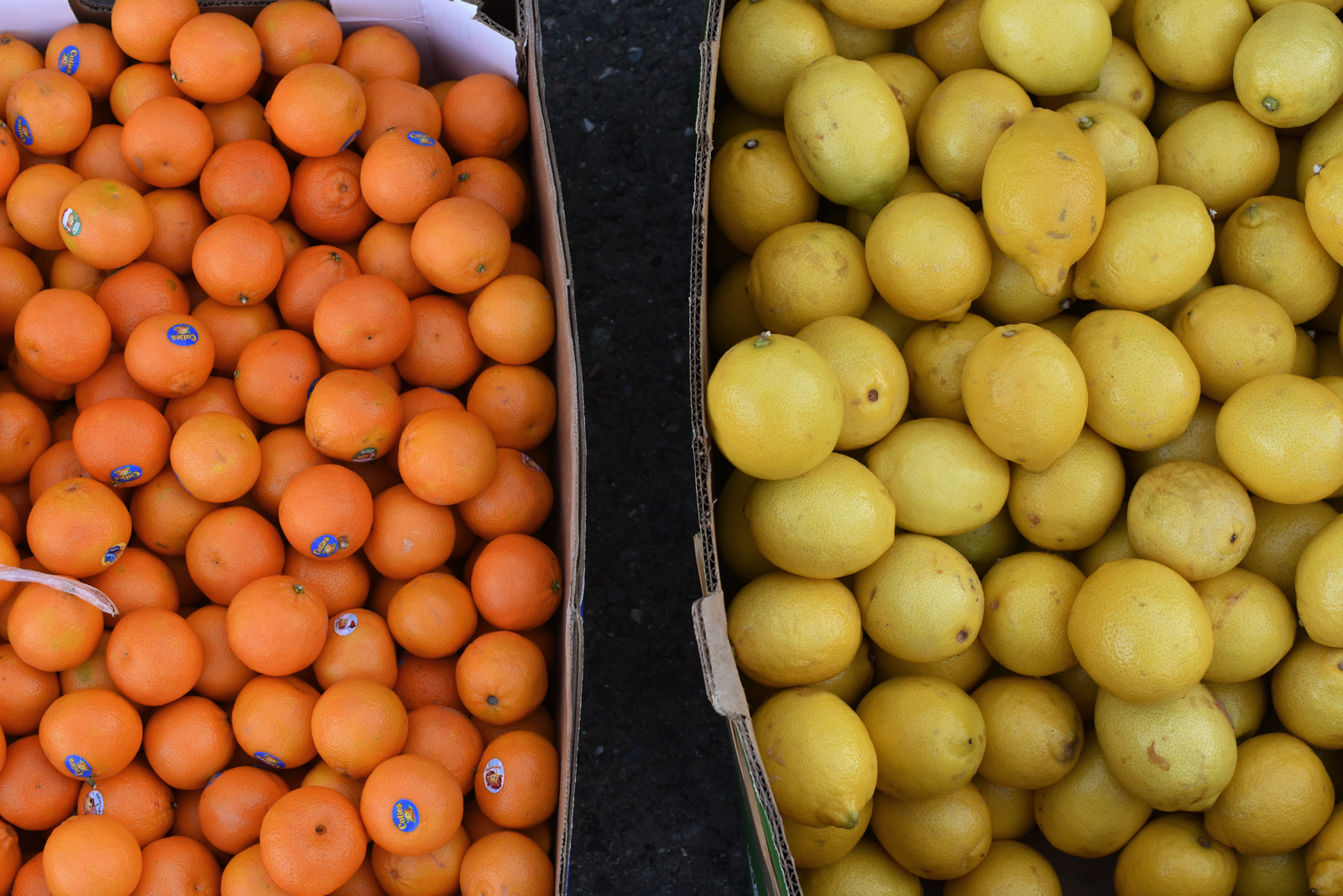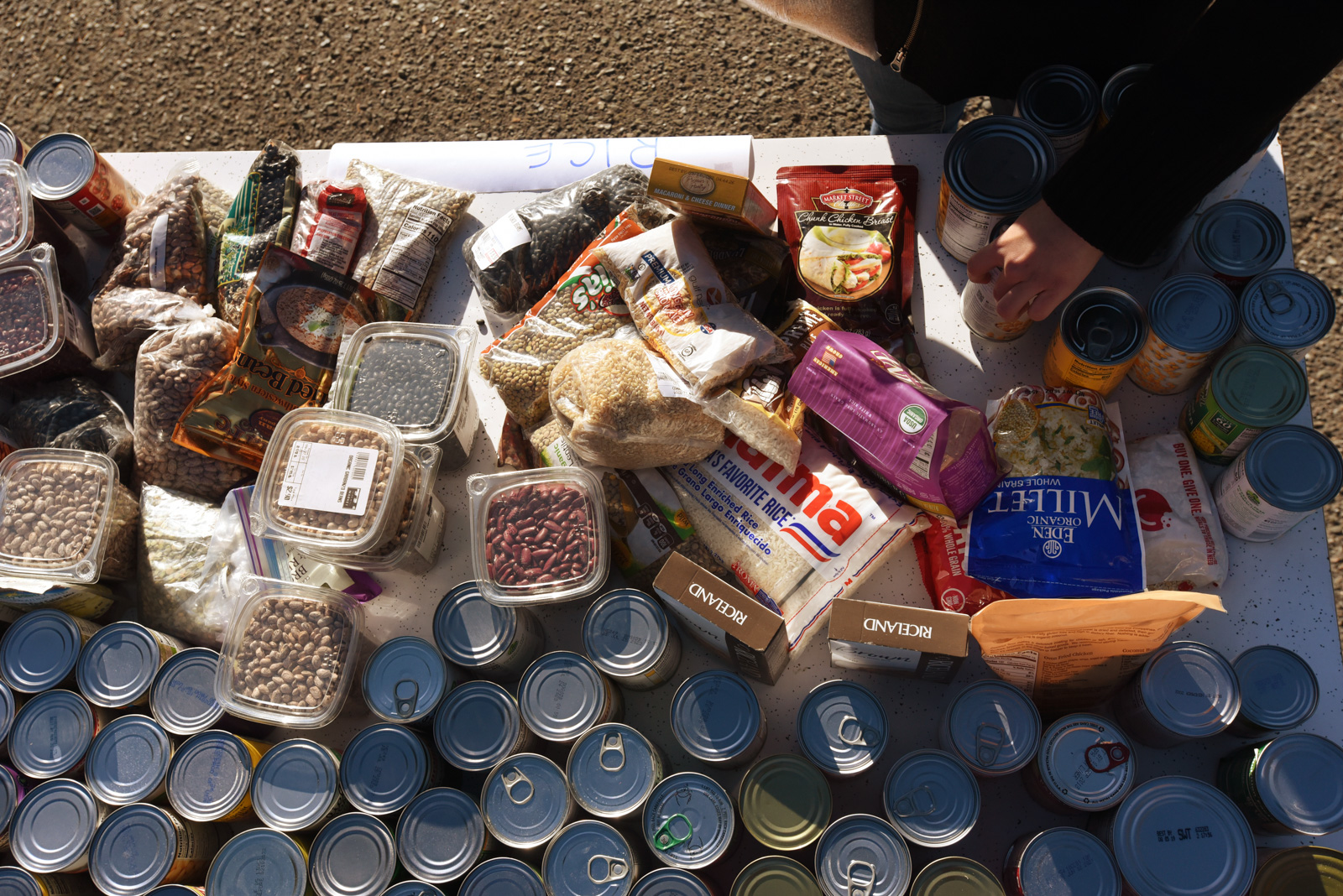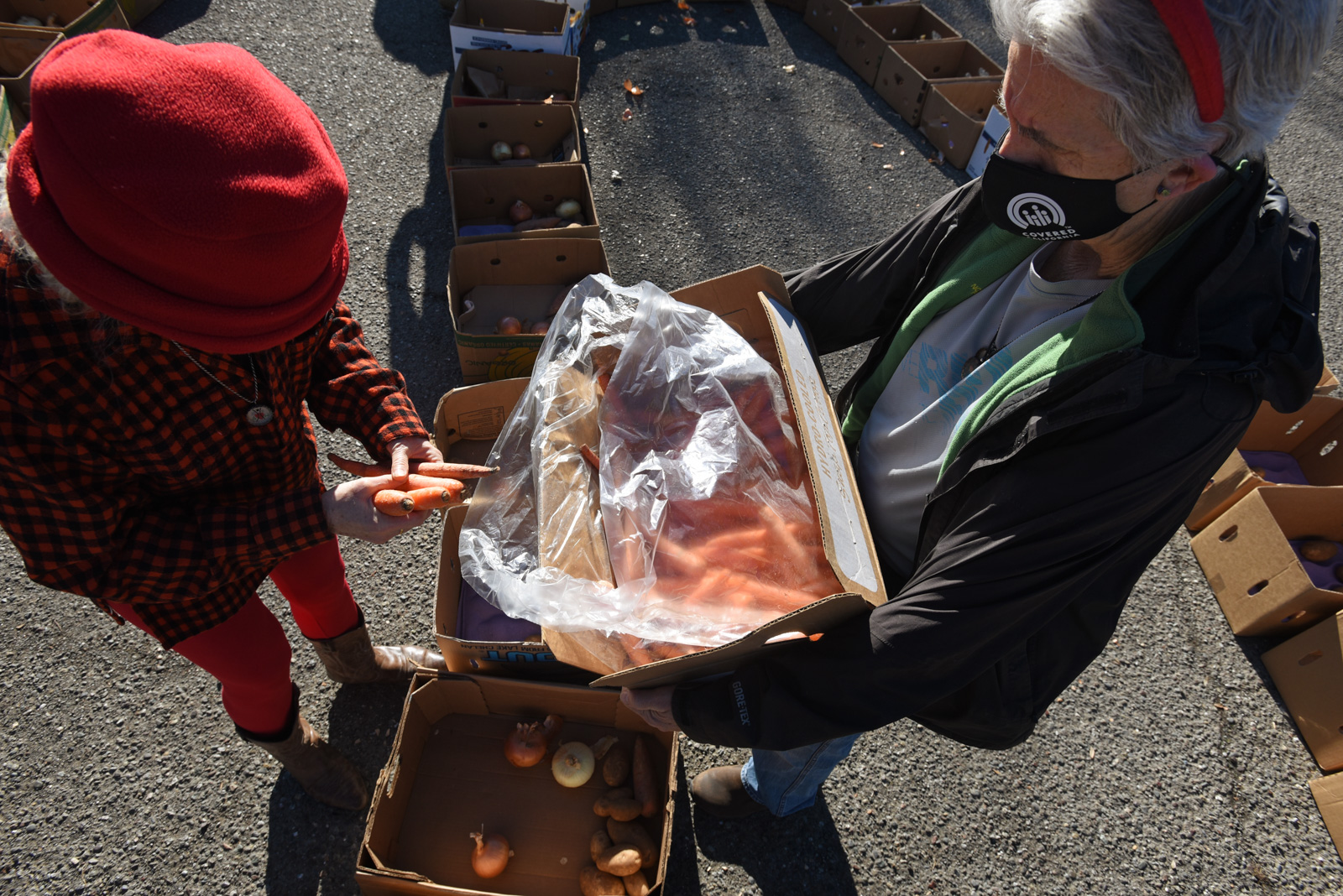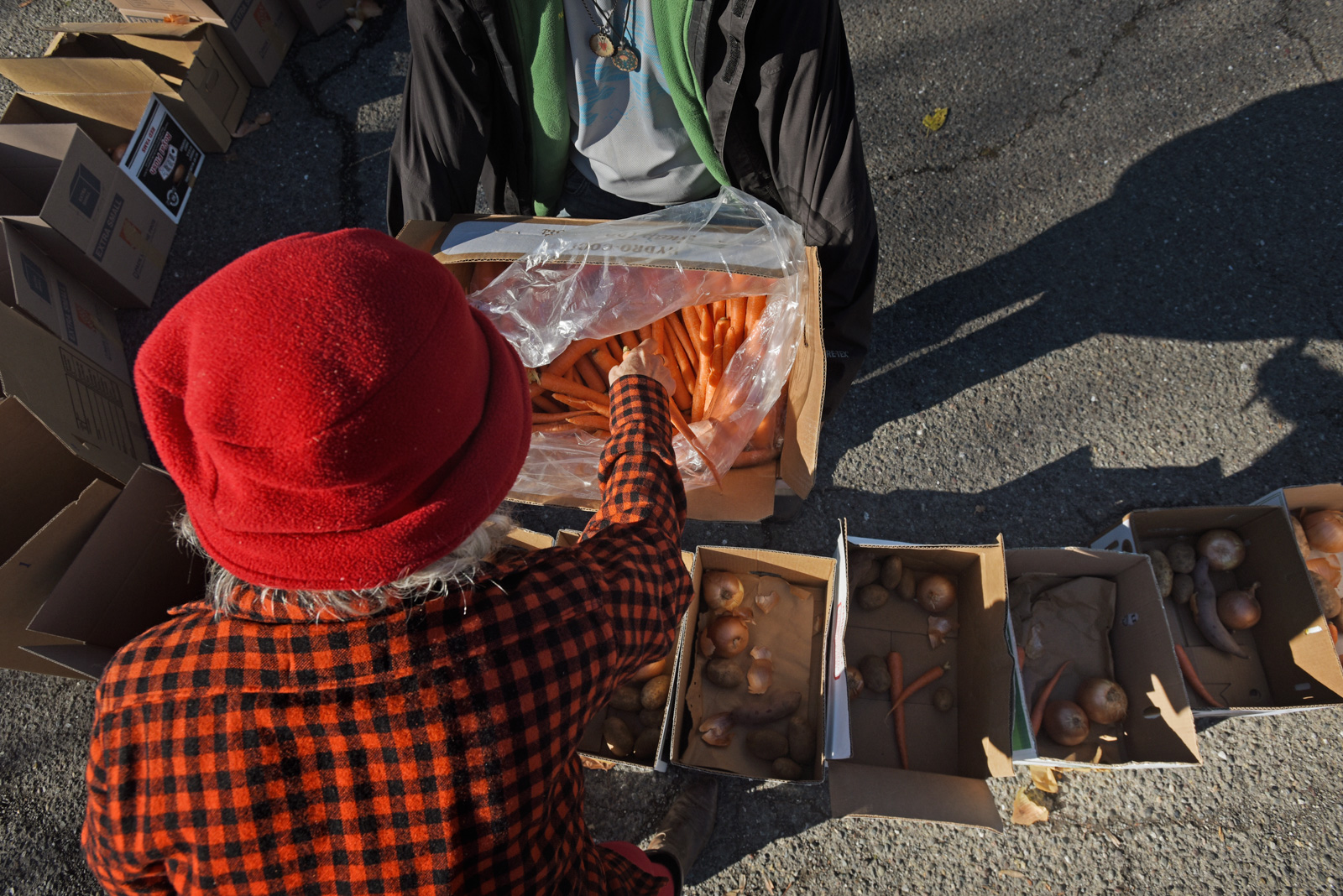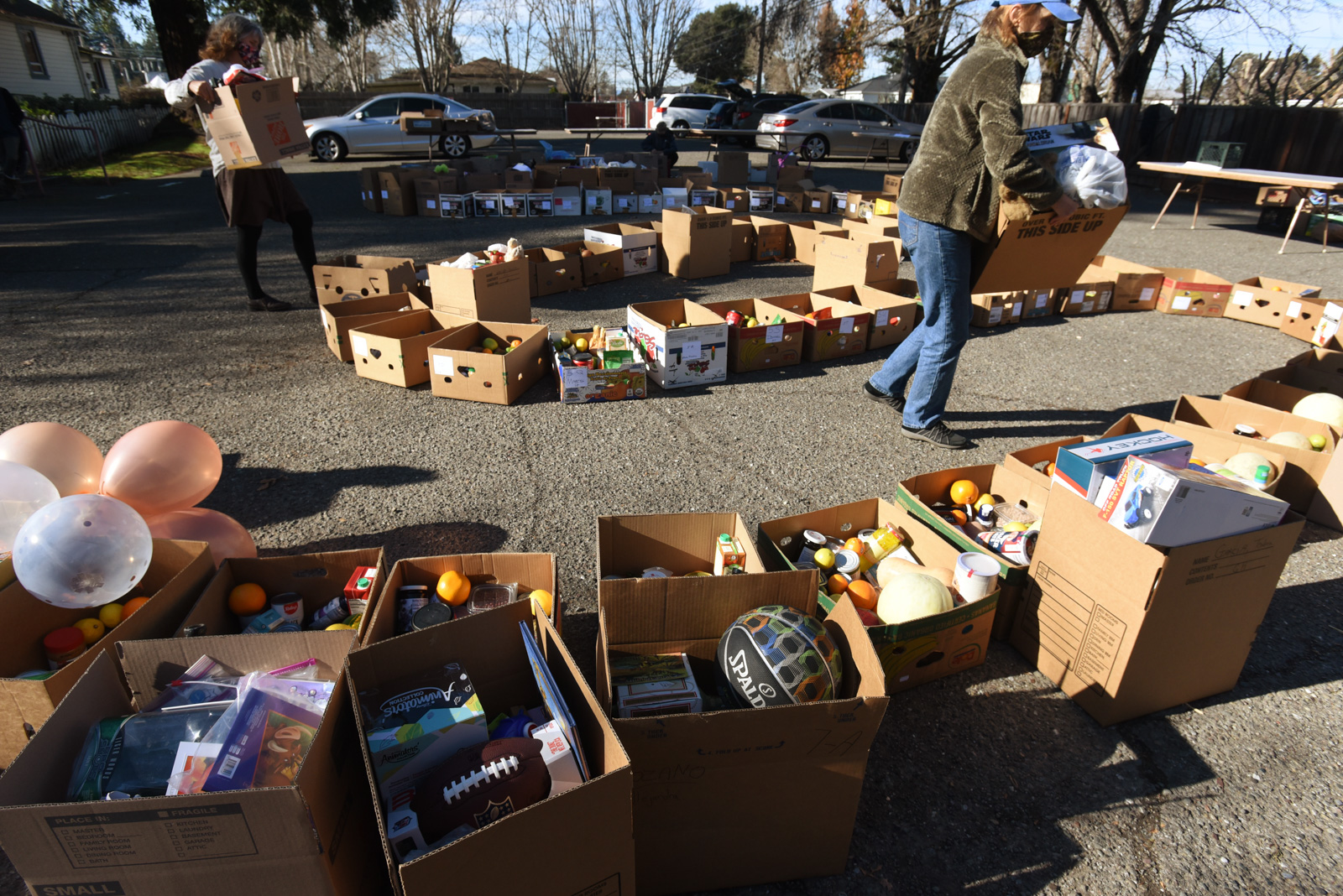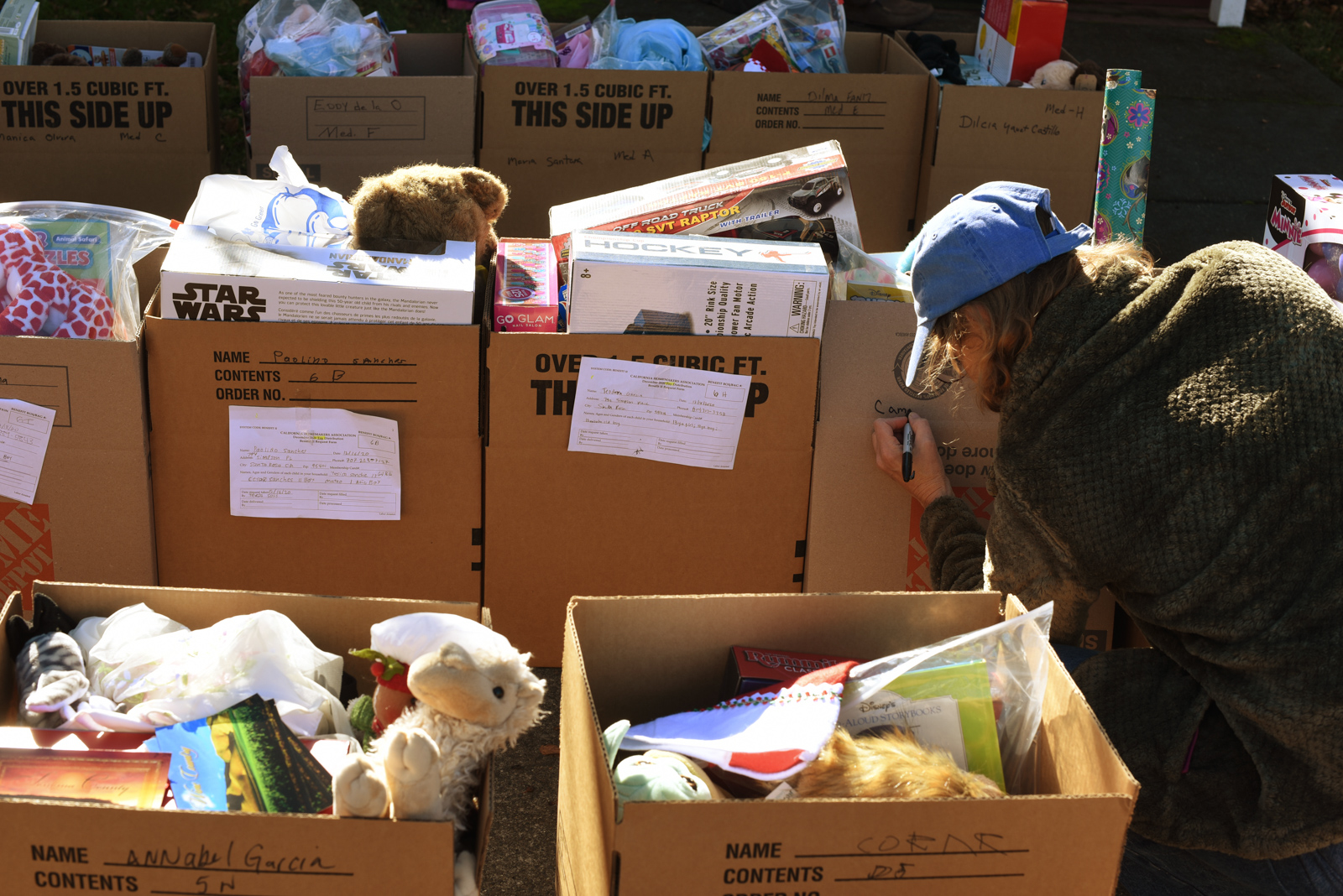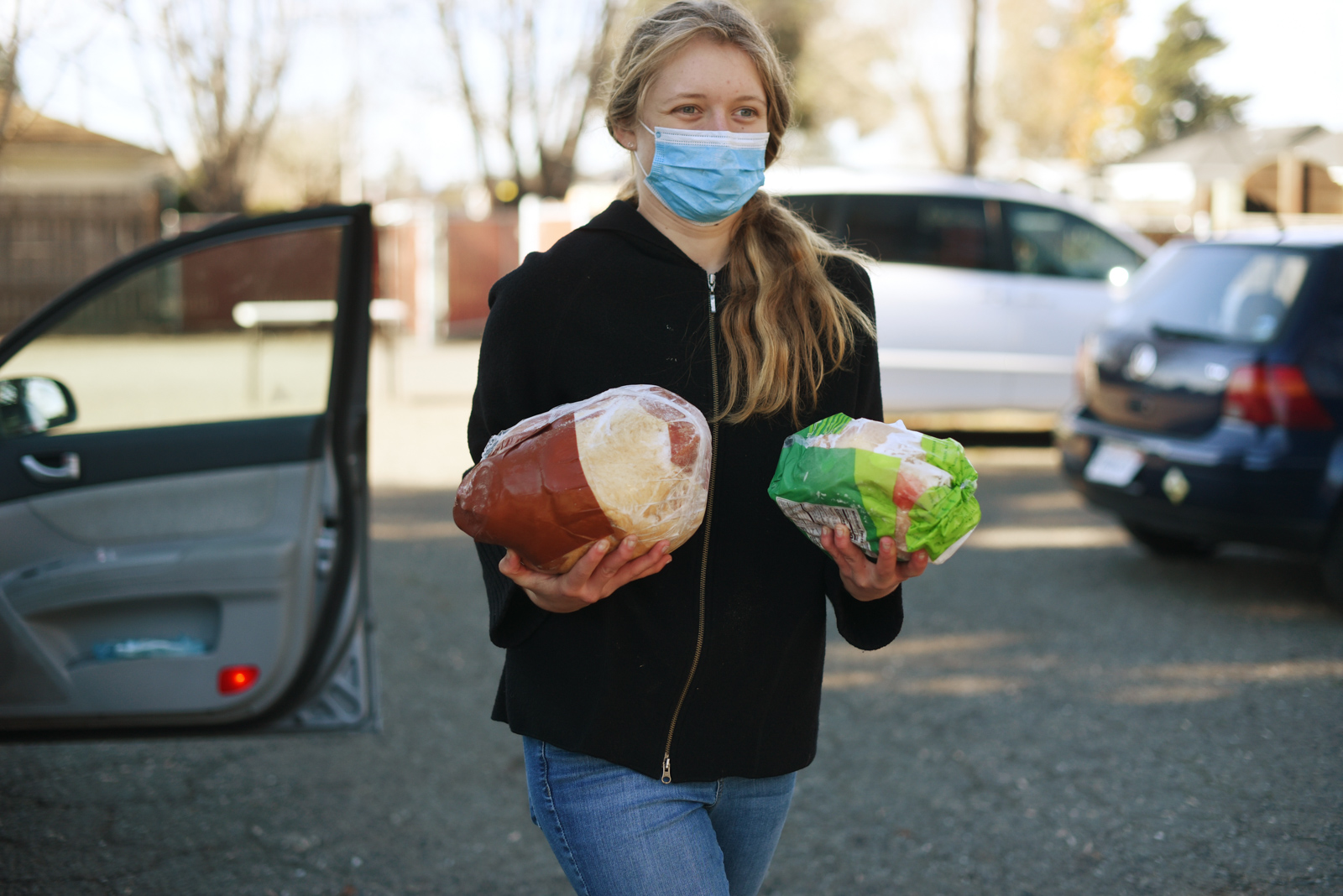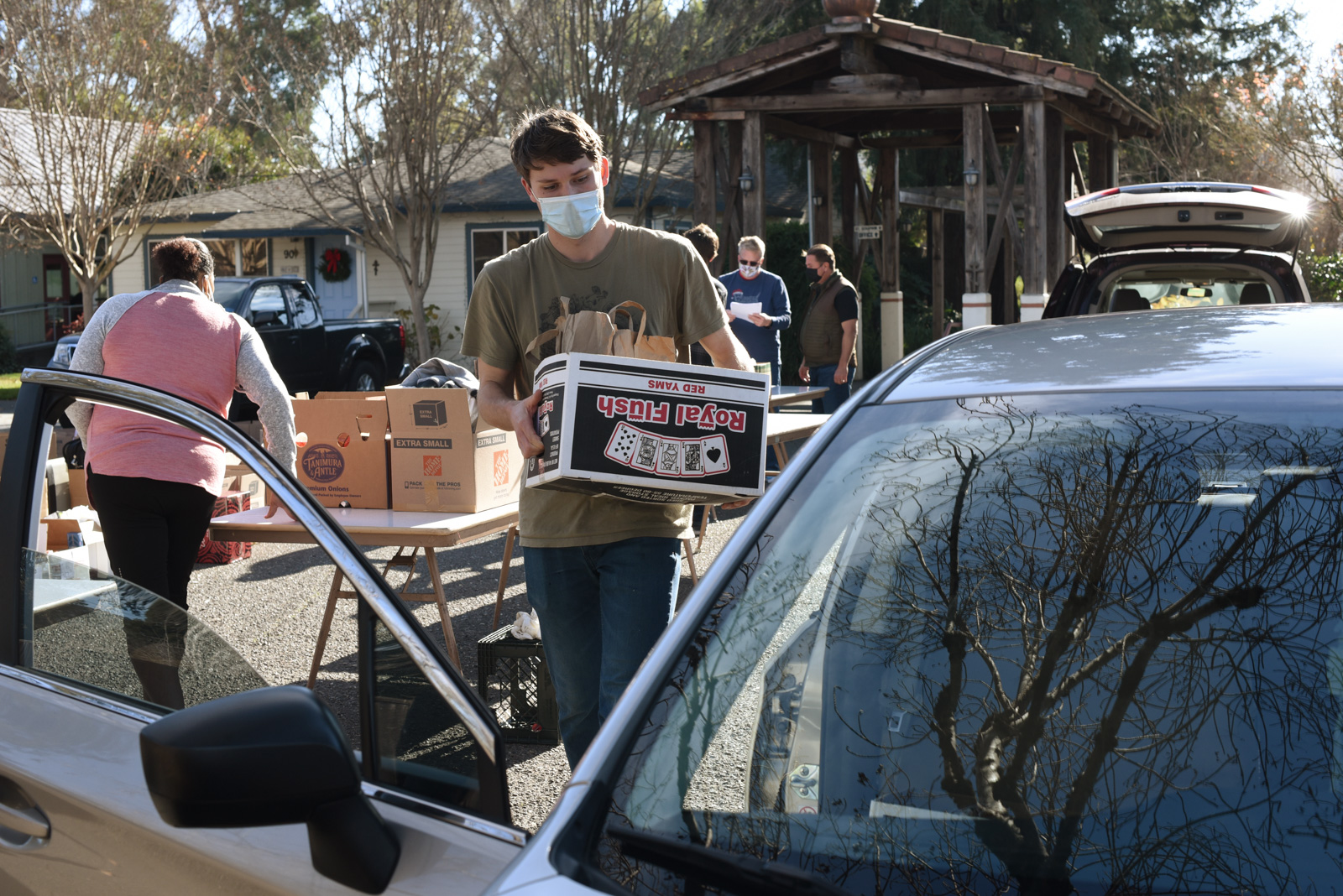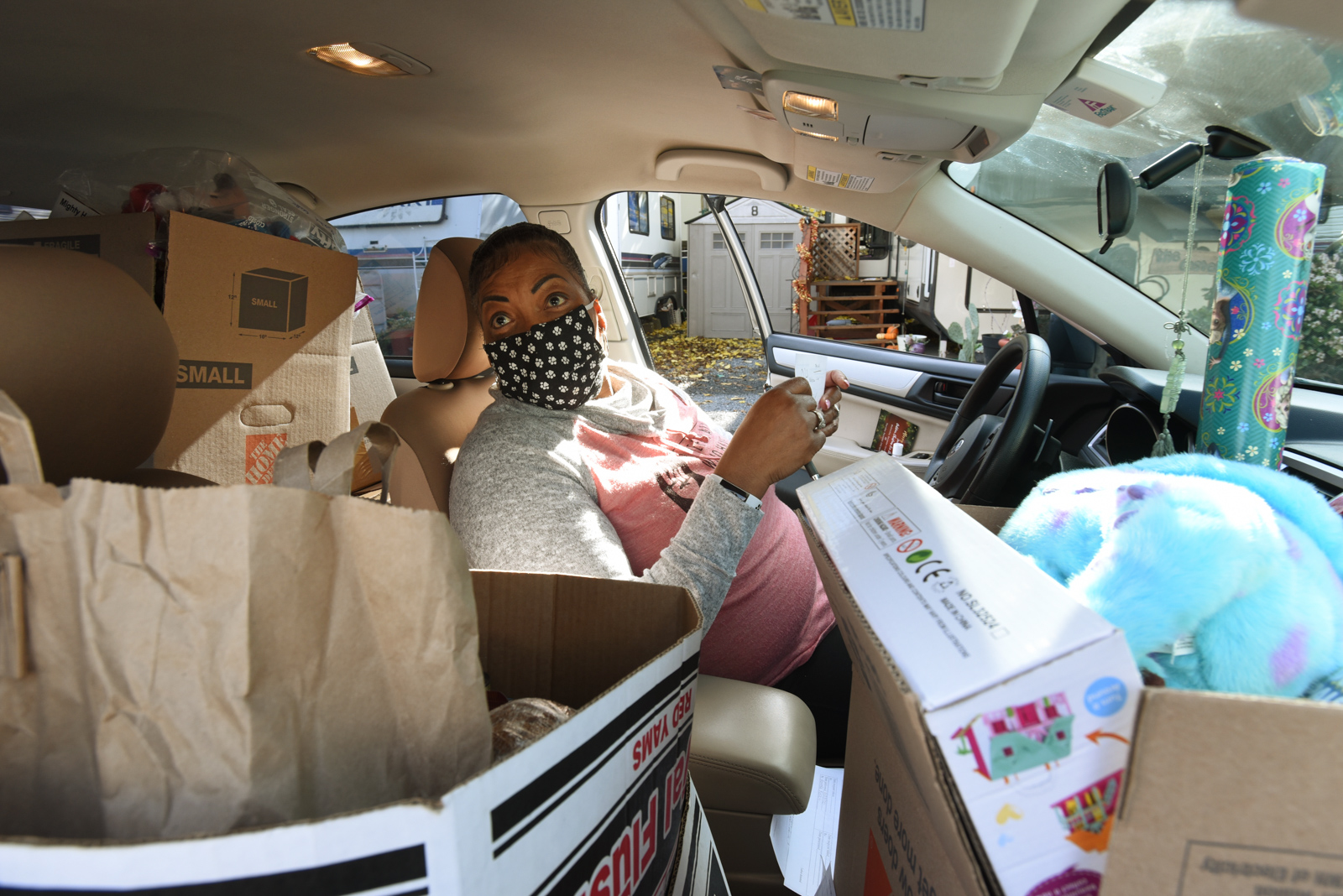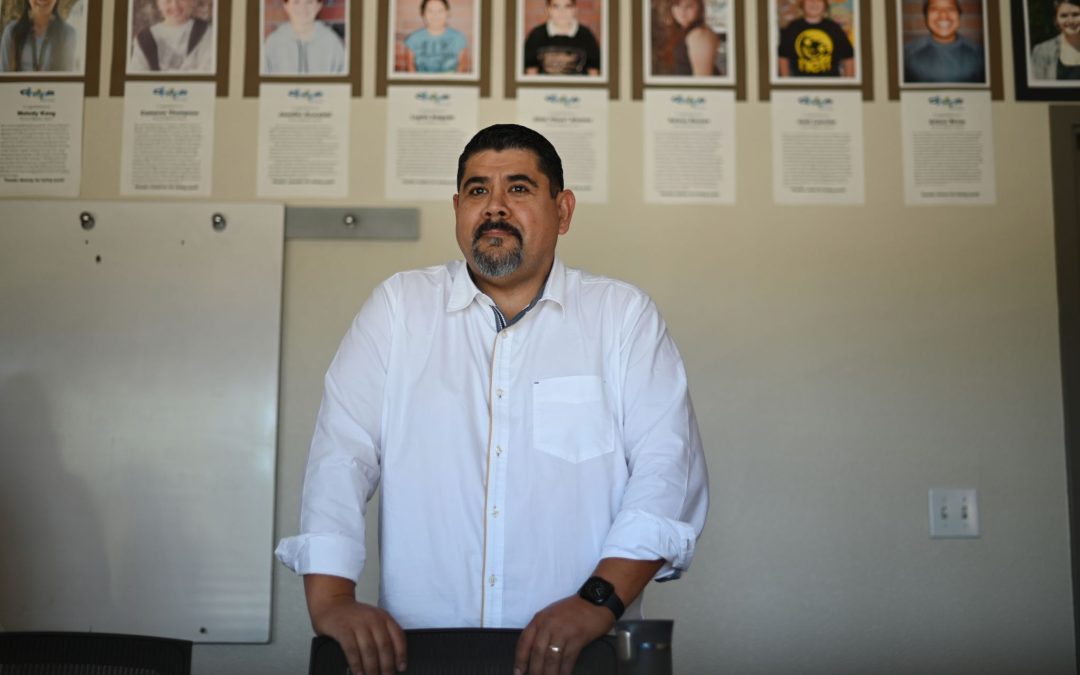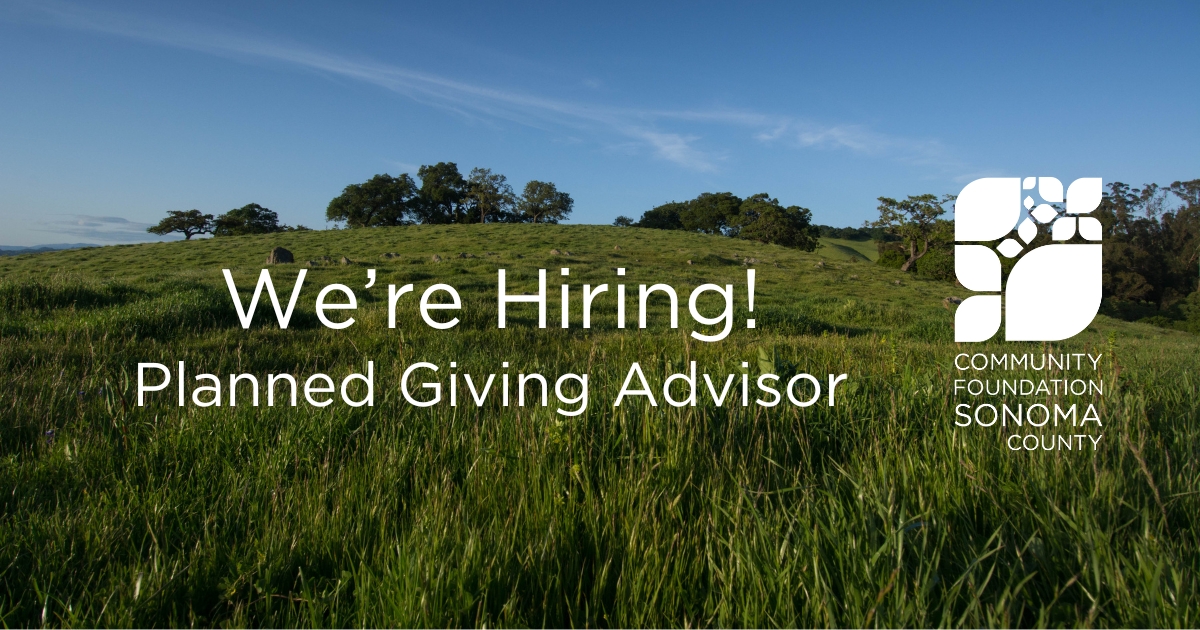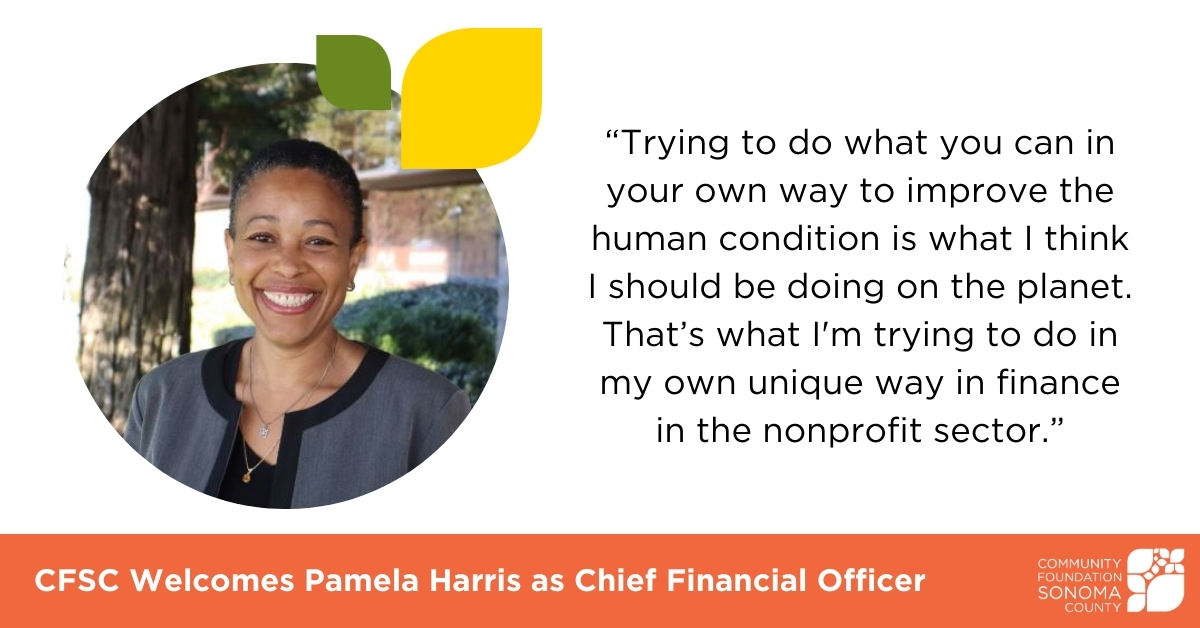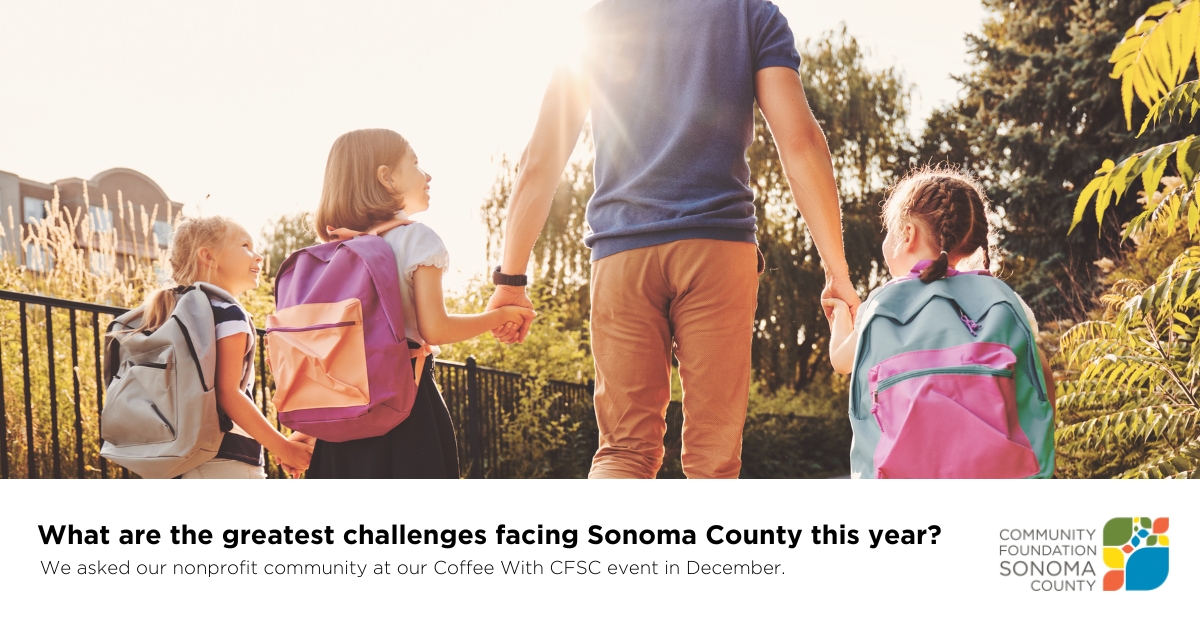Erica Diamond began volunteering with California Homemakers Association ten years ago after witnessing the problems and suffering in Sonoma County’s low-income communities.
“I wanted to do everything that I can to address the root causes of poverty,” she says. “And I found that CHA was organizing the low-income and often highly exploited members of the workforce together with allies from throughout the community, to offer both immediate aid and to build the sustainable long-term solutions.”
The work inspired her, and she has been in the role of full-time volunteer organizer and operations manager for the last seven years.
- Erica Diamond and a crew of volunteers for California Homemakers Association fill boxes of donated food and toys to be delivered by about a dozen volunteer drivers to about 100 low-income family homes mostly in the Roseland and South Park neighborhoods of Santa Rosa, California but also in several other locations in Sonoma County. December 19, 2020. Photo by: © Erik Castro
- Erica Diamond and a crew of volunteers for California Homemakers Association fill boxes of donated food and toys to be delivered by about a dozen volunteer drivers to about 100 low-income family homes mostly in the Roseland and South Park neighborhoods of Santa Rosa, California but also in several other locations in Sonoma County. December 19, 2020. Photo by: © Erik Castro
- Erica Diamond and a crew of volunteers for California Homemakers Association fill boxes of donated food and toys to be delivered by about a dozen volunteer drivers to about 100 low-income family homes mostly in the Roseland and South Park neighborhoods of Santa Rosa, California but also in several other locations in Sonoma County. December 19, 2020. Photo by: © Erik Castro
- Erica Diamond and a crew of volunteers for California Homemakers Association fill boxes of donated food and toys to be delivered by about a dozen volunteer drivers to about 100 low-income family homes mostly in the Roseland and South Park neighborhoods of Santa Rosa, California but also in several other locations in Sonoma County. December 19, 2020. Photo by: © Erik Castro
- Erica Diamond and a crew of volunteers for California Homemakers Association fill boxes of donated food and toys to be delivered by about a dozen volunteer drivers to about 100 low-income family homes mostly in the Roseland and South Park neighborhoods of Santa Rosa, California but also in several other locations in Sonoma County. December 19, 2020. Photo by: © Erik Castro
- Erica Diamond and a crew of volunteers for California Homemakers Association fill boxes of donated food and toys to be delivered by about a dozen volunteer drivers to about 100 low-income family homes mostly in the Roseland and South Park neighborhoods of Santa Rosa, California but also in several other locations in Sonoma County. December 19, 2020. Photo by: © Erik Castro
- Erica Diamond and a crew of volunteers for California Homemakers Association fill boxes of donated food and toys to be delivered by about a dozen volunteer drivers to about 100 low-income family homes mostly in the Roseland and South Park neighborhoods of Santa Rosa, California but also in several other locations in Sonoma County. December 19, 2020. Photo by: © Erik Castro
- Erica Diamond and a crew of volunteers for California Homemakers Association fill boxes of donated food and toys to be delivered by about a dozen volunteer drivers to about 100 low-income family homes mostly in the Roseland and South Park neighborhoods of Santa Rosa, California but also in several other locations in Sonoma County. December 19, 2020. Photo by: © Erik Castro
- Erica Diamond and a crew of volunteers for California Homemakers Association fill boxes of donated food and toys to be delivered by about a dozen volunteer drivers to about 100 low-income family homes mostly in the Roseland and South Park neighborhoods of Santa Rosa, California but also in several other locations in Sonoma County. December 19, 2020. Photo by: © Erik Castro
- Erica Diamond and a crew of volunteers for California Homemakers Association fill boxes of donated food and toys to be delivered by about a dozen volunteer drivers to about 100 low-income family homes mostly in the Roseland and South Park neighborhoods of Santa Rosa, California but also in several other locations in Sonoma County. December 19, 2020. Photo by: © Erik Castro
- Erica Diamond and a crew of volunteers for California Homemakers Association fill boxes of donated food and toys to be delivered by about a dozen volunteer drivers to about 100 low-income family homes mostly in the Roseland and South Park neighborhoods of Santa Rosa, California but also in several other locations in Sonoma County. December 19, 2020. Photo by: © Erik Castro
- Erica Diamond and a crew of volunteers for California Homemakers Association fill boxes of donated food and toys to be delivered by about a dozen volunteer drivers to about 100 low-income family homes mostly in the Roseland and South Park neighborhoods of Santa Rosa, California but also in several other locations in Sonoma County. December 19, 2020. Photo by: © Erik Castro
- Erica Diamond and a crew of volunteers for California Homemakers Association fill boxes of donated food and toys to be delivered by about a dozen volunteer drivers to about 100 low-income family homes mostly in the Roseland and South Park neighborhoods of Santa Rosa, California but also in several other locations in Sonoma County. December 19, 2020. Photo by: © Erik Castro
- Erica Diamond and a crew of volunteers for California Homemakers Association fill boxes of donated food and toys to be delivered by about a dozen volunteer drivers to about 100 low-income family homes mostly in the Roseland and South Park neighborhoods of Santa Rosa, California but also in several other locations in Sonoma County. December 19, 2020. Photo by: © Erik Castro
- Erica Diamond and a crew of volunteers for California Homemakers Association fill boxes of donated food and toys to be delivered by about a dozen volunteer drivers to about 100 low-income family homes mostly in the Roseland and South Park neighborhoods of Santa Rosa, California but also in several other locations in Sonoma County. December 19, 2020. Photo by: © Erik Castro
- Erica Diamond and a crew of volunteers for California Homemakers Association fill boxes of donated food and toys to be delivered by about a dozen volunteer drivers to about 100 low-income family homes mostly in the Roseland and South Park neighborhoods of Santa Rosa, California but also in several other locations in Sonoma County. December 19, 2020. Photo by: © Erik Castro
- Erica Diamond and a crew of volunteers for California Homemakers Association fill boxes of donated food and toys to be delivered by about a dozen volunteer drivers to about 100 low-income family homes mostly in the Roseland and South Park neighborhoods of Santa Rosa, California but also in several other locations in Sonoma County. December 19, 2020. Photo by: © Erik Castro
California Homemakers Association (CHA) was founded in Sonoma County in 2000 as an all-volunteer organizing drive of low-income domestic and service workers. The organization’s mission is for members to participate in the self-help, free of charge, 11 point benefit program, which includes emergency food, clothing, preventive medical care, legal advice, non-emergency dental care, information and referral, and financial advocacy, and more. Diamond says the benefit program is a way to provide some economic stability to help free up low-income workers and their families to organize together. “To change the fundamental reasons they’re poor in the first place,” she says.
The organization now has about 20,000 members comprised of in-home care workers, domestic workers, and the low-income elderly and disabled people they provide care for. Other members include farmworkers, landscapers, restaurant, hotel, and childcare workers. Member-volunteers stay connected and informed through grassroots organizing like canvassing, phone banking, and letter mailing.
Nicole Wasilewski of Santa Rosa began cleaning houses with her mother at a young age and has worked several retail jobs. Now a mother herself, she struggles with health issues while working toward becoming a peer counselor. She found CHA through a referral when she had dental issues she could not afford.
“I started volunteering doing mail outs and phone calls and attending membership meetings, and I’ve helped come up with ideas for campaigns,” she says. “I’m learning a lot of great skills from it: socializing, doing office work, and I really enjoy the atmosphere. Honestly, it’s been one of the highlights of this year, getting me out and volunteering, feeling like my skills are useful.”
Wasilewski says that living in poverty and lacking transportation has made the pandemic especially challenging for her and people like her. She deals with isolation and financial barriers. Yet, CHA has helped her with dental work and food, and she’s referred friends for support as well.
“I really needed this support system this year, and I appreciate that we take a self-help approach and that it isn’t some empty handout,” she says.
Since the pandemic began, many in Wasilewski’s position have turned to CHA for support. One form of support is the information and referral services provided through the organization’s phone tree. Diamond says that they’ve connected members to programs that have helped with rental assistance, legal issues involving immigration or worker safety, and more. They also get food to people through their emergency and supplemental food program, which has adapted to the pandemic through no-contact food distribution and deliveries and neighborhood food distributions. The emergency and supplemental food go out to 100-400 people per week.
“The members actually organize in their neighborhoods. We have delegates who know all the people in the area who are members who’ve needed help, and they reach out to them and vice versa,” says Diamond. “Our members host the distributions—one per week—and then we have our volunteers do the phone trees to reach out to everybody”
In mid-December, CHA organized a holiday food distribution of food baskets with turkeys or hams or chickens, along with fresh vegetables and non-perishables.
“We delivered to about a hundred households, which we estimated is a little over 500 people total,” says Diamond. “And we also did a toy distribution to members for the children, which was a little under 300 children, we were able to get toys to. There’s so much that’s needed right now.”.
Of those who need extra support during the pandemic, Diamond says CHA has heard from members who are caregivers, maintenance workers, and housekeepers about workloads being reduced to 40% of work they had pre-pandemic.
“Offices are now shut down. The people who were having them come to their homes are no longer having people come to their homes,” she says. “And it’s not like their rent went down to 30 to 40% of what they were paying before.”
Diamond points to the dire financial situation that many farmworkers, especially, have faced through the loss of work resulting from fires during their busiest work season, as well.
“It’s been tremendously difficult,” she says.
In an attempt to bridge the financial gap between wages and bills, CHA volunteers researched and compiled resources available to those most impacted. Yet sometimes, the organizations with financial resources don’t have translators.
“So we have volunteers that will help translate and help. Some of our members don’t read or write very well,” says Diamond. “Having people who can go through and fill out the applications with people is huge.”
A volunteer that helps with translations, among other things, is CHA member José de Jesús Enríquez, a Santa Rosa Junior College student who has been a member of the organization for nine years. Enríquez, who lives in Petaluma, receives in-home supportive services because he has cerebral palsy. He has found his role as a volunteer and organizer with CHA to be empowering for himself and those he connects with.
“I’ve been helping CHA with translating for people, for the benefits that CHA has like food, clothing, and volunteer doctors, dentists, and I have friends and family that are struggling because they are waitresses and construction workers,” says Enríquez. “It’s pretty hard on everyone who is working day by day, trying to pay rent.”
Yet, Enríquez says that organizing with CHA is helping him to build long term solutions.
Another volunteer who helps with translations is Loreen Theveny, who first connected with CHA 20 years ago. She has been a member ever since.
“I joined CHA because I believe in fighting for low-wage workers’ rights,” says Theveny. “I’m a student at Santa Rosa Junior College; I’m a tutor, an unemployed caregiver, as well as the unpaid caregiver for my mom because she doesn’t qualify for the IHSS program.”
The very says she and her mother are both struggling because of the pandemic; she notes that for low-income, unemployed or underemployed workers, there is a significant risk to face: either keep your family safe and lose work, or keep working and risk your health. The self-help, mutual aid programs at CHA have helped her navigate the challenges brought on by the pandemic.
“So I help CHA, and they help me,” she says. “CHA has taught me how to do phone calls and outreach. And I’m bilingual, so as well as helping with phone trees and learning about how organizing works and the history of organizing, I’m training others.”
CHA has also helped Theveny by providing nutritious food, which is something she says she can’t afford.
“We can’t wait three weeks when there’s a gap in government aid, and food stamps don’t always provide nutritious meals,” she says. “So someone helps me, I can help someone else, and it keeps going.”
CHA has not only provided food and adapted to the pandemic by training members on safety protocols and social distancing protocols, but through meeting other pandemic-related needs like supplying Personal Protective Equipment (PPE) to members, many of whom were not supplied with masks (including N95 masks during the 2020 fires) and other gear through their employers. Other members have needed household items like diapers or toilet paper. And it all comes to CHA through community donations.
“We have businesses and individuals and organizations that will run collections,” says Diamond. “They’ll tell all of their friends, or customers, or coworkers, or neighbors, post something on Nextdoor, and we’ve gotten a tremendous amount of support because people who aren’t suffering understand what a huge crisis this is and want to help.”
Diamond also says that the funding that Community Foundation Sonoma County recently provided has allowed CHA to expand their emergency food, hygiene, and PPE supply distributions to reach hundreds more membership households. The funds have also helped CHA to continue organizing free-of-charge medical and dental appointments through CHA’s volunteer doctors and dentists, and legal advocacy and information sessions for CHA members.
As they move into the new year, CHA will continue their programs while also searching for a larger space to meet their growing membership and that can provide the space they need for administrative tasks. Diamond does not see an end to the increasing need for services anytime soon, yet remains optimistic about the power of organizing.
“These are definitely unprecedented times, and so many people were suffering before the pandemic. And it’s up to us, I think, to really organize from the bottom up, building not only to help each other survive but to build these long-term sustainable solutions,” she says. “I know that the more that we can reach out together to connect and maintain these connections, the better. A strong community is an organized community.”
Story by Dani Burlison, photos by Erik Castro

